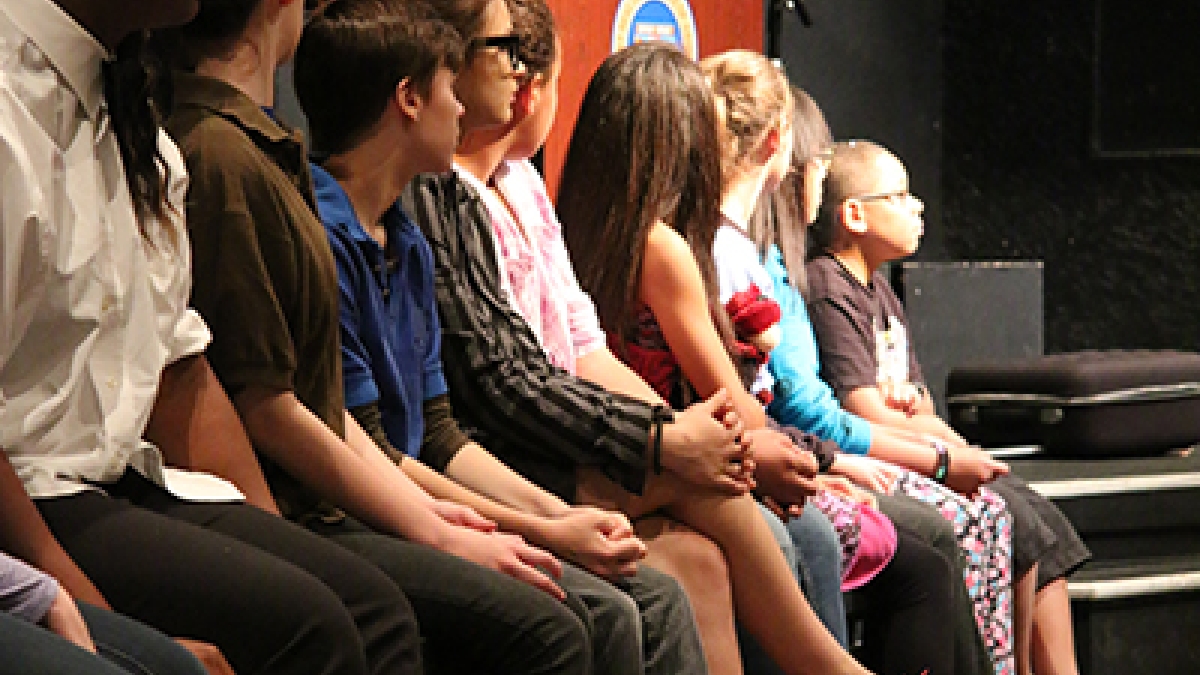Advocates for child welfare emphasize prevention, community engagement

Over 16,000 Arizona children are in group homes, foster care or other temporary placement. The costs – not only financial, but trauma to children and families – are staggering.
Child abuse prevention advocates from the public and private sectors gathered with the community to examine solutions at the Annual Statewide Child Abuse Prevention event held at the Rising Youth Theatre in downtown Phoenix, April 22.
Held as part of Child Abuse Prevention Month, the event aimed to increase dialogue around prevention and community involvement to help children and their families receive the resources and education they need to live healthy and productive lives.
Focusing on prevention
Charles Flanagan, director of Arizona Child Safety and Family Services, spoke on the importance of child abuse prevention and elevating efforts toward prevention to be at the same level as other services. He also noted that prevention is a shared responsibility, and community partnerships play an important role.
“One of the things that I’ve discovered is that we have got to raise the profile of the prevention work that we do, as well as intervene earlier when we get calls that require some sort of a response” he says. “So that’s what this is about. This is about us coming together and joining our resources together in such a way as to leverage our resources to affect a better outcome.”
Maricopa County Presiding Juvenile Court Judge Colleen McNally echoed the sentiment, noting the significance of parental education in lessening the risk of future intervention, and how connecting with the community helps build resilience.
Healthy Families Arizona, a statewide home visitation program is one such initiative.
“Healthy Families is a prevention-based program, birth to age five. We coach parents to be parents – developmental skills, parental skills and better forms of discipline,” says Sarah Tyree, family support specialist with Southwest Human Development, which offers the program.
Over the past 20 years, the program has seen a 99-percent success rate in the prevention of child abuse.
“We start with high-risk families who are at risk, so we really do make a difference in people’s lives,” says Suzanne Schunk, vice president of family support services for Southwest Human Development.
Researching factors that influence success
As part of the event, Rising Youth Theatre presented excerpts from the play "Shipwrecked." Playwright Sigrid Gilmer worked with foster youth and the adults who care for them to create a play that “tells the stories of the system from the perspective of the young people at the heart of it.”
Cynthia Lietz, associate professor in the School of Social Work and Tucson component coordinator for the College of Public Programs, pointed to examples in the play that highlight how individuals cope with challenging circumstances.
“Protective factors are key,” she says. “Social support – at least one meaningful relationship – can help keep someone on track.”
Protective factors can encompass a number of personal traits, too, including insight, creativity and humor.
Lietz’s research looks at how family units are able to sustain or improve their situations despite traumatic circumstances. In addition to investigating how negative experiences predict outcomes, she looks at success. She notes that it is easy to see a relationship between negative factors and failure, but more difficult to explain how people overcome adversity and succeed.
She says that overcoming adversity is possible.
Her work focuses on case studies of people who have completed care programs and succeeded. This has direct impact on the resources put in place for families.
McNally notes that while the courts intervene when an adverse event that has already occurred, they are still interested in ways to improve prevention. Working with ASU, they gain insight and measurable outcomes.
Building a community of support
“This event prompted important dialogue between public and community leaders committed to preventing child maltreatment. I was pleased to hear that director Flanagan plans to increase the amount of attention paid toward preventing abuse before it occurs,” Lietz says.
She also says that seeing these organizations come together to find creative ways of fixing the problem of child abuse prevention gave her, and those who attended, hope for future changes.
“The involvement of ASU’s School of Social Work in the event demonstrates our desire to partner with our public child welfare system to work toward achieving our shared mission,” she says. “All children and youth in Arizona should have the opportunity to grow up in a safe and loving environment.”
Written by Anastasia Landeros and Heather Beshears

